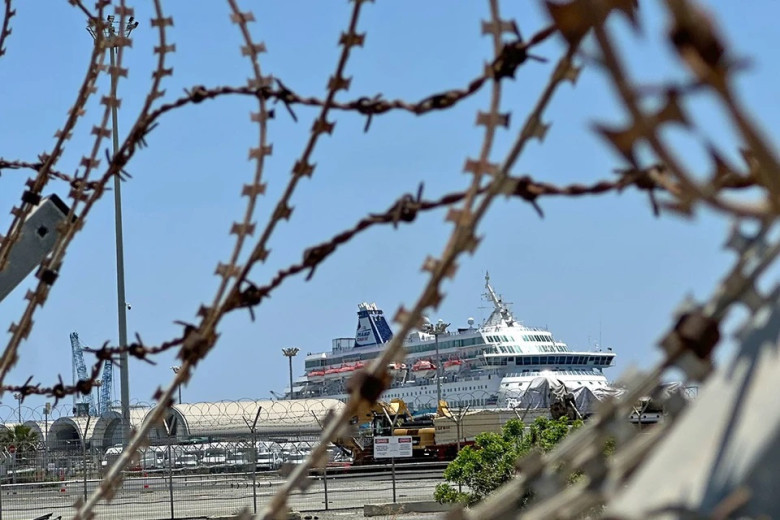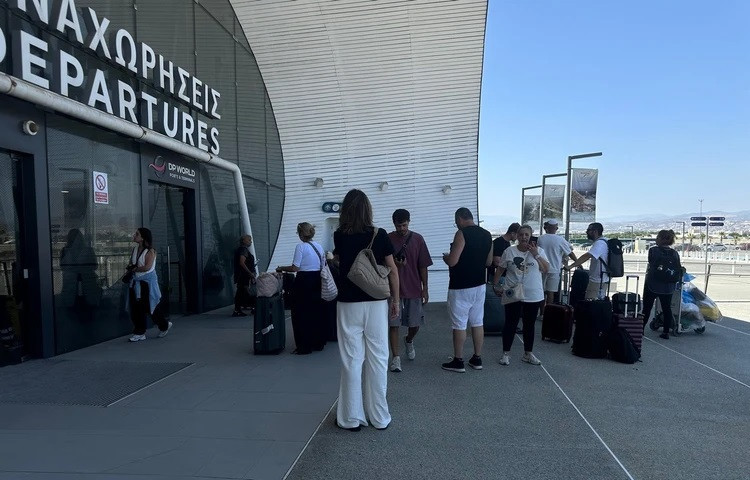Melting Soles and Blockaded Passengers: Israelis Rush to Board Flights Home from Cyprus
As tensions escalate in the region, thousands of Israelis stranded in Cyprus are facing a turbulent journey back home, and the stakes couldn't be higher. With the conflict stemming from Iran, Israeli citizens are currently prohibited from leaving their homeland. Only a slight easing of these restrictions is anticipated on June 23, allowing small exemptions—such as urgent medical treatment, funeral arrangements, or significant business obligations.

Before the turmoil erupted, many Israelis took to the seas, finding refuge in boats and yachts to safely navigate to Cyprus. However, as thousands are now stranded, returning home has become a chaotic ordeal filled with confusion, rising tensions, and financial burden.
A Stifling Day at the Port
Under the searing midday sun of forty degrees, I found myself at the Limassol port, peering through a barbed-wire fence. The imposing cruise liner, Crown Iris, stood before me. This vessel, with its eleven decks, swimming pool, basketball court, and casino, was a world away from the worries gripping thousands of stranded travelers. In peacetime, the luxury of a four-day cruise on this ship would set a person back 600 euros.
Now, however, this ship had a different mission—it was dispatched by Israeli officials to transport citizens from Cyprus back to Haifa. But nothing comes for free; the cost of this interim escape runs between 400 to 700 euros per individual, and the promised luxury service has been replaced by an undetermined experience in an evacuation scenario.
The entire operation to evacuate citizens from Cyprus is unfolding like a clandestine mission. The departure times are shifting constantly, leaving hopeful passengers scrambling for information. Many are relying on worn-out phones for updates, yet frustration is rampant. When I posed questions about the status, many just threw their hands in the air, revealing a shared frustration and confusion.
No Entry Despite Valid Tickets
Yesterday’s arrival of the Crown Iris brought over 1,500 tourists who had hastily exited Israel, but it was now in Limassol to embark 1,600 Israelis. Interestingly, it did so discreetly, sailing without a transponder until it hit Cyprus waters, aiming to avoid detection and possible complications.
As I approached the terminal, it was evident that a large number of nervous Israelis had gathered, hoping to board. Security officials were turning individuals away at the gates. "We have tickets, but they're not allowing us in," lamented Denis, who had flown in from Malta and had already been in Cyprus for four days, at his own expense.
"Are you worried about going back?" I asked. He shrugged off my concern, reassuring me that communication with family back home provided him with some peace of mind, as their air defense systems were reportedly intercepting missiles effectively.
In the midst of this, a distressed woman named Romi was animatedly questioning security. “We can't board because the authorities haven’t approved our return yet!” she exclaimed. Romi had been vacationing in Greece and was now separated from her children for three agonizing days. Meanwhile, another woman sat crying on the curb, fraying nerves over the uncertainty of when she'd reunite with her daughter.
The Yacht Alternative
As the heat radiated from the asphalt, soles of shoes began melting—amidst increasing frustration, many began to seek shelter from the long wait. As it became evident that those unable to board would have to find accommodations, taxis and buses were filled with disappointed travelers heading to nearby hotels or shopping centers, clinging to the hope of an evening departure.
But mere hours later, the Crown Iris left toward Haifa, escorted by the Israeli Navy, leaving many disappointed passengers behind. Speculation suggests the ship may conduct a few complementary trips in the coming days.
For those who can afford it, alternate transport has emerged. Yacht rentals now shuttle back and forth between Cyprus and Israel as a form of expensive "taxi service," with tickets running around 2,500 euros (or 225,000 rubles). Influential individuals have taken advantage of this mode of transport, including Minister of Aliyah and Integration Ofir Sofer, who was airlifted from Azerbaijan, coincidentally amid the outbreak of conflict.
Ongoing Evacuations and Ticket Dilemmas
Back in Israel, plans for Operation Safe Return were set into motion, with efforts to fly citizens home from cities worldwide, from New York to Paris. However, ticket prices surged, driven up by the need to fill empty seats—many more expensive than usual.
As I arrived at Larnaca airport, the atmosphere was tense, amped up by stringent security measures. Upon entry, I was met with stern warnings against filming or entering terminals unless I was flying. The flow of planes from Cyprus to Tel Aviv is constant, yet nearly every flight appears to have complications, often delayed by hostile strikes from Iran, which has forced some aircraft to circle the skies awaiting landing clearance.
A young traveler waiting for his fourth attempt to fly home voiced a familiar frustration, and echoes of similar stories floated through the terminal; tickets vanish in moments, but information remains elusive.
Tensions in the Community
Near the local synagogue, armed police increased their presence in response to rising concerns. Inside the community center dubbed the Habat House, patience was wearing thin as a steady stream of taxis pulled up, delivering both hopeful and anxious travelers.
Local residents have witnessed protests reflecting sentiments against Israel over the weekend, and visible graffiti expressing "Freedom for Palestine" heightened the apprehensive atmosphere. While police insisted there have been no incidents, an underlying tension was palpable, prompting additional security measures.

In neighboring hotels, overflowing with visitors seeking refuge, administrators affirmed their establishments were at capacity.
Amid declarations from Israeli officials that a full return of citizens would complete within a week, Transport Minister Miri Regev indicated an impressive tally of around 100,000 to 150,000 stranded citizens worldwide.
Yet, not everyone is rushing back. Anna Maria Roizman, for example, was enjoying a Berlin trip when the turmoil began and promptly opted to extend her stay. However, with limited finances and a lack of resources—her Hebrew keyboard not available—her position is precarious. Employers back home have begun to pressure workers, threatening disciplinary action against those who extend their vacations, pushing many into a frantic dilemma over financial stability versus personal safety.















Comments
0 comment